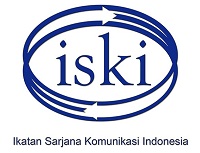What They Do Not Talk about When They Talk about Radicalism: (A Corpus-assisted Discourse Analysis on Islamic News Portals in Indonesia)
Abstract
The lack of a clear definition of radicalism leads Islamic organisations to feel entitled to interpret it. It results in contention for the meaning of radicalism and forms a different reality for each reader. By taking a case study on two spectra of Islamic organisations, moderate Islamic organisation (NU Online) and Islamic extremist organisation (Portal Islam), this study aims to understand the construction of radicalism in two Islamic news portals. We utilised a dataset of news about radicalism from September 2018-2019 and analysed it using a combination of corpus linguistic (CL) and critical discourse analysis (CDA). While CL helped to reveal emerging discourses, CDA intended to observe the patterns and relate them into socio-political contexts critically. The results indicate that each site was blurring the information function of news portals into a propaganda function. They also generate fragmented knowledge, which leads to a misrepresentation of paradigm towards radicalism. This leads to discriminatory actions against other groups. The meaning of radicalism in the media may encourage group dichotomy, which is counterproductive to countering terrorism in Indonesia. This study contributes to a comprehension of the terrorism phenomenon by providing a closer view of how moderate and extreme Islamic organisations interpret radicalism.
Keywords
Full Text:
PDFReferences
Amerian, M., & Esmaili, F. (2014). Language and gender: A critical discourse analysis on gender representation in a series of international ELT textbooks. International Journal of Research Studies in Education, 4(2). https://doi.org/10.5861/ijrse.2014.963
Andersen, J. C., & Sandberg, S. (2018). Islamic State Propaganda: Between Social Movement Framing and Subcultural Provocation. Terrorism and Political Violence. https://doi.org/10.1080/09546553.2018.1484356
Anthony, L. (2019). AntConc (Version 3.5.8) [Computer Software]. Waseda University.
Baker, P., Gabrielatos, C., Khosravinik, M., Krzyzanowski, M., McEnery, T., & Wodak, R. (2008). A useful methodological synergy? Combining critical discourse analysis and corpus linguistics to examine discourses of refugees and asylum seekers in the UK press. Discourse and Society, 19(3), 273–306. https://doi.org/10.1177/0957926508088962
Cheng, W., & Cheng, W. (2015). Corpus-Based Linguistic Approaches to Critical Discourse Analysis Corpus-Based Linguistic Approaches to. July. https://doi.org/10.1002/9781405198431.wbea10262
Chertoff, M. (2008). The Ideology of Terrorism: Radicalism Revisited. Brown Journal of World Affairs, 15.
Crenshaw, M. (2014). Terrorism Research: The Record. International Interactions, 40(4), 556–567. https://doi.org/10.1080/03050629.2014.902817
Dijk, T. A. Van. (2003). Wacana, Pengetahuan, dan Ideologi: Reformulasi Sejumlah Persoalan Klasik. MediaTor, 4(1), 1–18. https://doi.org/10.29313/mediator.v4i1.785
Fairclough, N. (2001). Language and power. Routledge.
Hizbullah, N., Rachman, F., & Fauziah, F. (2017). Penyusunan Model Korpus Al-Qur’an Digital. JURNAL Al-AZHAR INDONESIA SERI HUMANIORA, 3(3), 215. https://doi.org/10.36722/sh.v3i3.209
Hülsse, R., & Spencer, A. (2008). The Metaphor of Terror: Terrorism Studies and the Constructivist Turn. Security Dialogue, 39(6), 571–592. https://doi.org/10.1177/0967010608098210
Jaworska, S. (2016). Using a Corpus-Assisted Discourse Studies (CADS) Approach to Investigate Constructions of Identities in Media Reporting Surrounding Mega Sports Events: The Case of the London Olympics 2012. In Critical Event Studies (pp. 149–174). Palgrave Macmillan UK. https://doi.org/10.1057/978-1-137-52386-0_8
Karaffa, C. A. (2012). Intellectual Courage and The Social Construction of Terrorism: Embodying Reality. University of Pittsburgh.
Karaffa, C. A. (2015). The social construction of terrorism. Sociology of Crime Law and Deviance, 20, 67–87. https://doi.org/10.1108/S1521-613620150000020004
Karomani, K. (2004). Pengaruh Ideologi Terhadap Wacana Berita Dalam Media Massa. MediaTor (Jurnal Komunikasi), Vol 5, No 1 (2004): Filsafat Itu Ibarat Orang Bertanya, 39–45. https://ejournal.unisba.ac.id/index.php/mediator/article/view/1096
Khotimah, E. (2003). Ba ’ asyir dalam Pertarungan Wacana. Mediator: Jurnal Komunikasi, 4(1), 19–28. https://doi.org/https://doi.org/10.29313/mediator.v4i1.789
Lauderdale, P., & Oliverio, A. (2018). The social problem of terrorism. In The Cambridge Handbook of Social Problems (Vol. 2, pp. 155–172). Cambridge University Press. https://doi.org/10.1017/9781108550710.011
Leeuwen, T. van. (2008). Discourse and Practice: New Tools for Critical Discourse Analysis. Oxford Scholarship Online. https://books.google.co.id/books?id=4AgSDAAAQBAJ&printsec=frontcover&dq=Discourse+as+the+recontextualization+of+social+practice:+A+guide&hl=id&sa=X&ved=2ahUKEwiyh_78--jqAhXhILcAHaUnBigQ6AEwAHoECAEQAg#v=onepage&q&f=false
Mahood, S., & Rane, H. (2017). Islamist narratives in ISIS recruitment propaganda. Journal of International Communication, 23(1), 15–35. https://doi.org/10.1080/13216597.2016.1263231
Malkki, L., & Sallamaa, D. (2018). To Call or Not to Call It Terrorism: Public Debate on Ideologically-motivated Acts of Violence in Finland, 1991–2015. Terrorism and Political Violence, 30(5), 862–881. https://doi.org/10.1080/09546553.2018.1447191
Maulana, D. (2018). Situs-Situs Islam: Kontestasi Narasi Radikal dan Moderat (Vol. 1, Issue 3).
McCauley, C., & Moskalenko, S. (2008). Mechanisms of Political Radicalization: Pathways Toward Terrorism. Terrorism and Political Violence, 20(3), 415–433. https://doi.org/10.1080/09546550802073367
Mubarok, M. Z., & Hamid, A. F. A. (2018). The Rise of Radicalism and Terrorism in Indonesia and Malaysia. Review of Islam in Southeast Asia, 1(1), 29–43.
Neumann, J., Robson, A., & Sloan, D. (2018). Monitoring and evaluation of strategic change programme implementation—Lessons from a case analysis. Evaluation and Program Planning, 66(October 2017), 120–132. https://doi.org/10.1016/j.evalprogplan.2017.09.012
Neumann, K., Arendt, F., & Baugut, P. (2018). News and Islamist Radicalization Processes: Investigating Muslims’ Perceptions of Negative News Coverage of Islam. Mass Communication and Society, 21(4), 498–523. https://doi.org/10.1080/15205436.2018.1430832
Neumann, P., & Kleinmann, S. (2013). How Rigorous Is Radicalization Research? Democracy and Security, 9(4), 360–382. https://doi.org/10.1080/17419166.2013.802984
Neumann, P. R. (2013). The trouble with radicalization. International Affairs, 89(4), 873–893. https://doi.org/10.1111/1468-2346.12049
Ömer Taşpınar. (2009). Fighting Radicalism, Not “Terrorism”: Root Causes of an International Actor Redefined. SAIS Review, 29(2), 75–86. https://doi.org/10.1353/sais.0.0059
Partington, A. (2015). Corpus-Assisted Comparative Case Studies of Representations of the Arab World. In Corpora and Discourse Studies (pp. 220–243). Palgrave Macmillan UK. https://doi.org/10.1057/9781137431738_11
Porta, D. Della, & LaFree, G. (2012). Guest Editorial: Processes of Radicalization and De-Radicalization. International Journal of Conflict and Violence (IJCV), 6(1), 4–10. https://doi.org/10.4119/IJCV-2926
Powell, K. A. (2011). Framing islam: An analysis of U.S. media coverage of terrorism since 9/11. Communication Studies, 62(1), 90–112. https://doi.org/10.1080/10510974.2011.533599
Reisigl, M., & Wodak, R. (2001). Discourse and discrimination : rhetorics of racism and antisemitism. Routledge.
Schlegel, L. (2018). Online-Radicalisation: Myth or Reality ? In Facts & Findings (Issue 314).
Schmid, A. P. (2013). Radicalisation, De-Radicalisation, Counter-Radicalisation: A Conceptual Discussion and Literature Review.
Sedgwick, M. (2010). The concept of radicalization as a source of confusion. Terrorism and Political Violence, 22(4), 479–494. https://doi.org/10.1080/09546553.2010.491009
Sudibyo, A. (2001). Politik Media dan Pertarungan Wacana. LKiS Pelangi Aksara.
Thomas, P. (2016). Youth, terrorism and education: Britain’s Prevent programme. International Journal of Lifelong Education, 35(2), 171–187. https://doi.org/10.1080/02601370.2016.1164469
Umar, A. R. M. (2010). Melacak Akar Radikalisme Islam di Indonesia. Jurnal Ilmu Sosial Dan Ilmu Politik, 14(2), 169–186. https://doi.org/10.1158/1541-7786.MCR-07-0324
van de Weert, A., & Eijkman, Q. A. M. (2019). Subjectivity in detection of radicalisation and violent extremism: a youth worker’s perspective. Behavioral Sciences of Terrorism and Political Aggression, 11(3), 191–214. https://doi.org/10.1080/19434472.2018.1457069
van Dijk, T. A. (1993). Principles of Critical Discourse Analysis. Discourse & Society, 4(2), 249–283. https://doi.org/10.1177/0957926593004002006
van Dijk, T. A. (1994). Critical discourse analysis. In Discourse & Society (Vol. 5, Issue 4, pp. 435–436). https://doi.org/10.1177/0957926594005004001
van Dijk, T. A. (2013). News As Discourse. In News As Discourse. Taylor and Francis Inc. https://doi.org/10.4324/9780203062784
DOI: https://doi.org/10.29313/mediator.v13i2.5859
Refbacks
- There are currently no refbacks.

This work is licensed under a Creative Commons Attribution 4.0 International License























